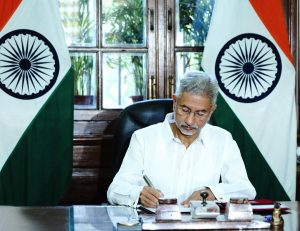For the first time since Narendra Modi became India’s prime minister in 2014, he will preside over a coalition government. His administration will be constrained by the whims and fancies of a motley group of allies. What changes does this portend for the future of Indian politics?
Even after falling well short of a majority of 272 seats in parliament, Prime Minister Narendra Modi’s Bharatiya Janata Party (BJP) will be the largest party in the ruling National Democratic Alliance (NDA). Modi will need to make domestic concessions to keep his allies happy – especially Nitish Kumar and Chandrababu Naidu, who are looking to endear themselves to their regional voter bases. These machinations of coalition politics, however, are unlikely to tamper with the foreign policy matrix for the foreseeable future.
It is thus widely believed that Modi 3.0 will be a period of continuity in foreign policy. Writing for The Diplomat, Rishi Gupta contoured a fairly detailed roadmap of the likely arc and strategic orientation of Indian foreign policy, arguing that cementing India’s status as an emerging power and global leader will continue to be a key pivot of India’s strategy. A comparison of the 2019 and 2024 BJP manifestos reveals that the strategic priorities of Modi 3.0 are unlikely to change.
Even as analysts broadly agree with the macro-level aims of this continuity in Indian foreign policy, a question that beckons deeper interrogation is: How sensible are some of its micro-level levers to achieve those aims?
In the past few decades, India has shored up the capability to become a nationalistic rising power. The emergence of India’s “swing-state diplomacy” has been linked to standing unapologetically for its own interests, and taking foreign policy from an elite concern to a mass conviction. Taking foreign policy to the masses has been a key feature of governmental messaging under Modi. The palpable sense of India having “arrived” on the global stage has only strengthened after a much-celebrated G-20 presidency, with the Indian economy doing relatively better than most of its peers in the developing world, and its vibrant market driven by services being recognized globally.
This has translated into greater nationalist assertiveness — in turning down critics and booing indicators that downgrade Indian democracy. “Roasting” has become something of a specialty of continuing External Affairs Minister S. Jaishankar’s public engagement. Be it buying energy from the Russians after the Ukraine War or the balancing act on Gaza, India has increasingly started to make the case for treatment as a unique civilizational state. Jaishankar’s two books, “The India Way” and “Why Bharat Matters,” are good sources to understand the intent of India’s new diplomacy.
Here is where Modi 3.0 needs to tread cautiously. Rising powers are often nationalist, but that nationalism can just as easily blind them to the structural constraints of the system in which they operate. The nationalist invocation of “Bharat” might have an ideological motive, but the more concerning development is that the desire to be treated as a unique civilizational state is undermining India from being treated as a liberal one. There is no codification of the treatment that a civilizational state deserves, or why it deserves special treatment in the first place.
The civilizational argument can also lead to India being perceived as mirroring the Chinese approach of attempting hegemony, which can alienate key allies and trample over the goodwill that has given it strategic maneuverability. The creation of an indigenous democracy indicator seems to suggest that being “liberal” in terms of certain global universal values just does not cut it anymore. Stances taken outside that “liberal” framework should now be accorded respect because they are, purportedly, a consequence of India’s unique cultural inheritance and “decolonized” strategic culture.
The recent sourness on the Pannun controversy, while unlikely to significantly alter relations with the West, is an indicator of the risks this approach holds. India must also not be ignorant of U.S. actions to consolidate ties with other actors in the Indo-Pacific, and invigorate the new “Squad” with Australia, Japan, and the Philippines. Having been a key lever of the Indo-Pacific rapprochement, India cannot afford to take U.S. goodwill for granted. Ensuring that the Squad develops complementarily to (and not as a replacement for) the Quad is imperative going forward. The West may not be hedging against India yet, but incentives to do so can be created quite easily in a fragmented world.
Plus, the very global order that India’s foreign policy nationalism lambasts is also what gives India the legitimacy to call out China on its borders, and the legal instruments to justify responding to a future attack on Indian soil. This is not to say that there is not a valid basis for raising the civilizational state question. The contemporary institutionalization of the global order is Eurocentric, and there may be a case to explore how the Westphalian order can accommodate the demands of civilizational polities. Yet, that will continue to be an academic debate for the foreseeable future, unlikely to fructify into concrete changes unless there is a stable balance of power.
Thus, as the Indian diplomatic corps prepares for Modi 3.0, a crucial caveat: taking the nationalist route on everything when it comes to foreign affairs might just end up undermining India’s national objectives. The momentum will remain high as India’s global capital surges, provided the newly elected government plays its cards prudently.

































